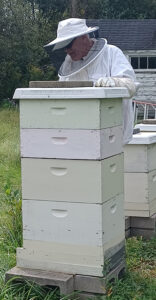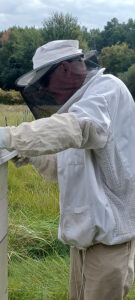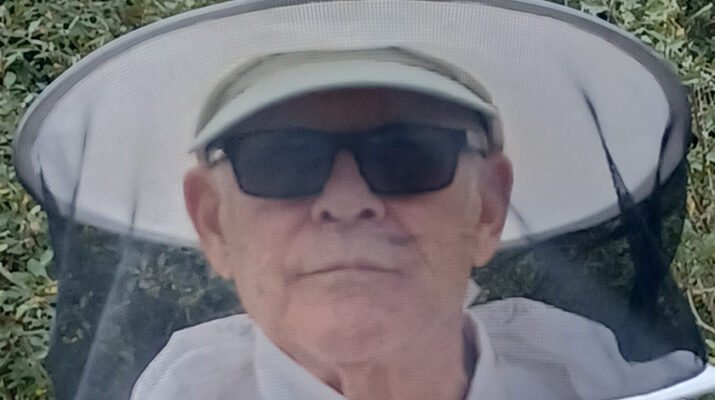A novel way to treat PTSD: East Amherst facility offers a program to veterans and non-veterans where they learn to maintain and tend to honeybees
By Patrick Sawers
 When it comes to treating post-traumatic stress disorder, veteran groups across the country are beginning to recognize the therapeutic advantages of suiting up and getting into beekeeping.
When it comes to treating post-traumatic stress disorder, veteran groups across the country are beginning to recognize the therapeutic advantages of suiting up and getting into beekeeping.
It may seem counterintuitive at first, but the intense focus and concentration required to wade into a field of laboring honeybees — a controlled but nonetheless chaotic and potentially dangerous situation — can often help quell some of the stress and anxiety associated with PTSD, also helping to block out distressing memories of the past.
And, based largely on that strategy, an East Amherst facility is offering a program, now open to veterans as well non-veterans, where students learn to maintain and tend to bees, whether part-time as a hobby or even as a small-scale business opportunity. It’s called “Helmets To Hives,” and next season will mark its seventh year in operation.
“The original intent was to work with veterans in beekeeping, primarily those who suffered from PTSD and other things,” said Steve Krumm, the program’s founder. “And it’s been shown within the beekeeping community to lower stress levels and so forth. So for veterans, that’s extremely important as they make the transition back into society.”
Krumm, who served as an artilleryman in Vietnam and then worked as a horticulturist with Portland’s public parks system, conceived of the idea in 2017 after retiring and relocating to Buffalo, where he developed an interest in beekeeping.
Seeking to put that knowledge to good use, Krumm said, he eventually connected with someone from Buffalo Niagara Heritage Village and the region’s first beekeeping program for veterans was born.
Buffalo Niagara Heritage Village, established by the town of Amherst to showcase the town’s numerous contributions to the region’s history, sits on 35 acres of land off of Tonawanda Creek Road, featuring numerous historical buildings and structures preserved from the 19th century. A quarter-acre portion of the property was cordoned off for development of the project and a functioning apiary was constructed to get the program up and running.
“When this was brought to me, I knew absolutely nothing about beekeeping,” said Sara Miller, BNHV’s director of education and programs, who was charged with shaping the program and developing the coursework. “I was terrified of bees and I said, ‘Why me?’ But I have come to actually love it and have found the calming and health benefits that come out of it, because it is an extremely rewarding experience.”
 Around that time a local veterans’ peer support group, the Veterans One-Stop Center of Western New York, wanted to become involved with beekeeping and it dispatched a handful of members to take the “Helmets To Hives” course. One of them was Bill Arnold, who proved instrumental in bringing that organization onboard and into the fold.
Around that time a local veterans’ peer support group, the Veterans One-Stop Center of Western New York, wanted to become involved with beekeeping and it dispatched a handful of members to take the “Helmets To Hives” course. One of them was Bill Arnold, who proved instrumental in bringing that organization onboard and into the fold.
“They were very interested in actually starting a program,” Arnold said, referring to the Veterans One-Stop Center. “They wanted to do this on a regular basis, and it really made much more sense for them to collaborate here and to work here, instead of trying to start a whole new program. So after I’d taken the classes Veterans One-Stop approached me, knowing that I did beekeeping, wanting to know if I actually wanted to jump in and team up with Steve here. And I was like, ‘Yeah, definitely. That would be great.’”
After its first year the program was opened up to include non-veterans as well, Krumm said, something that has shown to be mutually beneficial for everyone involved.
“We decided we really wanted to involve veterans and what we call the civilian population together, so they could interact in a teaching setting, a learning setting,” he said. “And it provides for a much better climate of readjustment, because people can talk back and forth about their various experiences. We’ve tried to equalize the program with both men and women, because women veterans are suffering probably worse than male veterans at this point, only because of the added component of sexual abuse that goes on in the military. And that has worked very well. They’ve felt comfortable and safe, which is the kind of environment we want to provide for.”
“That community-veteran combination, we wanted to expand that,” Arnold agreed, pointing to the success of similar programs around the country. “And one of the best peer support efforts is to have the community involved, because if you get the veterans acclimated back into the community better and have the community accept them better, things just progress so much better that way.”
The program begins with an introductory class, followed by several months of actual hands-on beekeeping experience, with students tending to the five active, honey-producing hives toward the back of the property.
“Our introduction class is usually quite well-attended,” said Miller, although she added that space in the hands-on part of the program is limited. “Not everyone who goes to that will actually go on to take the hands-on portion. For the classroom part we usually have about 50 or so people. For the actual outdoor part, since we try to keep it to two people per hive, we usually cut off at 10 to 12. We usually have a waiting list.”
“We’re looking forward to starting up again next year,” Miller said. “I’m working on my calendar now, so I’m anticipating we’ll hold the class in February and March. That way, if someone comes and they’re starting their own hives they still have time to purchase bees. We try to do it early enough in the year that there’s still time to get the equipment before the actual season starts.”

